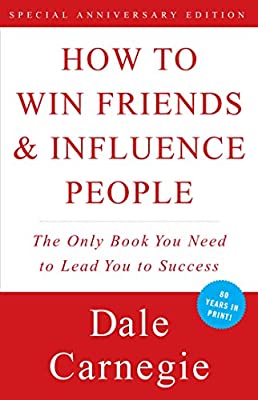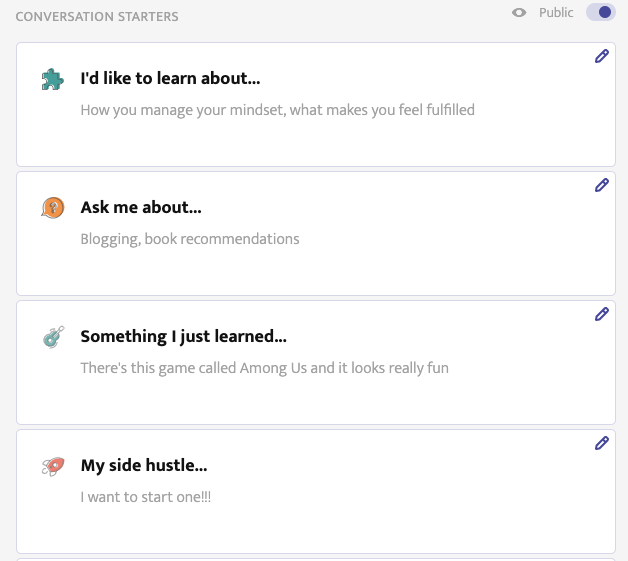I recently re-read this iconic book. While I found many of the stories and examples a little outdated and hard to relate to, the underlying ideas remain relevant.
The book goes through a whole bunch of ideas — you can see the full list here.
I’m just going to focus on my three key takeaways.
Featured Book: How to Win Friends and Influence People by Dale Carnegie

Become genuinely interested in other people
Since I’m naturally curious about others, this is easy for me. Whenever I meet someone new, I ask about all sorts of stuff. Where did you get those nice shoes? If money wasn’t an issue, what would you be doing with your life?
However, I’ve also been guilty of judging a book by its cover. When I meet someone who seems a little on the quiet side, I tend to give up on asking them questions because I don’t want to be the only one driving the conversation. This is a real shame since they could have had some great insights to share.
I understand that some people may be shy or unsure of what questions to ask to drive a conversation. The simplest tip I have for people in that situation is to wait for someone else to initiate a conversation, and then turn whatever question the other person asks back on them as well (if appropriate) so that they also get a chance to share.
Otherwise, it could be as simple as asking, “how’s your day been so far?” or if you’re at an event, asking “what brings you here today?” Once you kick off the conversation, it usually flows quite naturally.
I’ve recently been using the networking platform Lunchclub to meet new people. (Shoutout to my friend Emily from The Fang Girl for introducing it to me!) I think it’s a great platform because it not only matches me with interesting people, it also provides conversational topics if you don’t know what to talk about.
Each person gets to put their answers to generic “Conversation Starters” on their profile, which you can change whenever you feel like it.

You can also list your interests and provide a short bio of yourself on your profile.


This comes in handy during our video calls since it tells us something interesting about the other person that we can talk about.
One of my matches had “Ask me about… My crazy backpacking adventures and bucket list” on her profile, which sparked a conversation about her travel stories. If she hadn’t volunteered that information, I probably never would’ve known to ask that question.
I’ve also a few of my matches ask me questions related to my conversation starters. It makes our one-hour meeting fly by so quickly.
Having said that, I’ve also come across people who talk too much about themselves and don’t give the other person any airtime.
On that note, it’s important to…
Be a good listener and encourage others to talk about themselves
It’s no fun when one person is rambling on and the other person is forced to listen for an extended period of time. I’ve come across this issue because I’m naturally more of a listener than a talker, and I feel bad about stopping people from talking on about things.
Have you ever walked away from a conversation where the other person was listening intently to what you were saying? Did you feel like you really liked them even though you couldn’t really say why?
When people listen to you, it makes you feel validated and important.
If someone spent most of the conversation talking about themselves, you likely walked away thinking that they’re self-absorbed and don’t really care about others.

Listening is even more crucial when you’re in disagreement with someone.
Even if you disagree with them, listen to what they have to say. You may not change your mind, but at least you gave them a chance to share their point of view.
I’ve come across who are so fixated on getting their own point across that they talk over the other person while they are speaking. That’s how high their level of self-importance and narrow-mindedness is.
These people will have trouble maintaining their relationships with others since the other person will feel as though their opinions are never respected. And of course, if they’re so narrow-minded, they won’t ever consider any other perspectives and have a very limited view of life.
That’s why we should always…
Try to honestly see things from the other person’s point of view
We’ve all had our own unique life experiences and developed views on things in line with that. While we may believe that our view is the “correct” or “valid” one, it always pays to try to understand where someone is coming from.
As we go through life, our view of reality is always going to be subjective.
When we see a parent beat their child with a cane, some might think of it as violent and abusive, whilst others might find it perfectly normal and acceptable because that is what they grew up with. Our experiences inform our judgments.
It doesn’t mean that you need to condone what you think is violence. It’s fair for you to believe that it’s the “wrong” thing to do to a child. But it doesn’t mean that you should judge the parent or put them down without understanding where they’re coming from.
Putting it all together
I picked these three takeaways because they’re so interconnected.
When you become genuinely interested in other people and give them the space to share about themselves and truly listen, you can put yourself in their shoes and see things from their point of view.
In a way, you become more like them and they feel more connected to you because you understand where they’re coming from and validate their experience.
In the reverse, not doing these three things is a good way to lose friends and annoy people. 🙂






